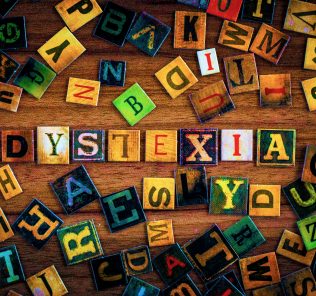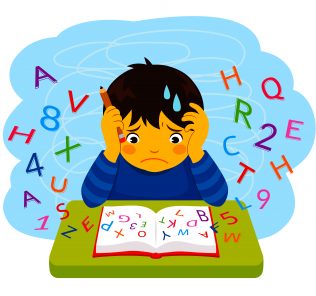World Dyslexia Awareness Week: When, why and how to test your child for Dyslexia in the UAE
Albert Einstein.
Cher.
Richard Branson.
Keira Knightley.
Pablo Picasso.
No, this isn’t our ultimate dinner party guestlist.
Rather, these incredibly successful public figures, all of whom are icons of excellence in their chosen field, have just one thing in common:
They’re all dyslexic.
World Dyslexia Day is held on the Thursday of World Dyslexia Awareness Week each year, which in 2022 runs from 3 – 9 October.
The week is intended to encourage people to reflect on the barriers that those living with dyslexia often face, while also focusing on how individuals and the education system have continued to succeed and break through these obstacles.
For parents, the idea that your child might have Dyslexia can seem like a frightening prospect. You might associate it with perceived problems you’d rather your child not have, or you might want to put off tackling it as an issue – whether that’s because of the cost of getting tested, a fear of possible stigma, or something else.
But the positive difference that getting diagnosed and supported for Dyslexia can make to a child is huge.
And, as the celebrities listed above demonstrate, Dyslexia is certainly not a barrier to success or excellence.
In fact, some people believe that the different way of thinking that stems from Dyslexia can even be a superpower…
Here, we look at what Dyslexia is, how and when it can be diagnosed, and how children can be supported both inside and outside of school.
What is Dyslexia?
Dyslexia is a neurological difference or neurodiversity that affects a student’s word reading accuracy, reading rate or fluency, and can present challenges with reading comprehension, spelling and writing.
Dyslexia can have a significant impact on a person’s experience in the academic environment, as well as in their professional and daily lives.
However, not everyone experiences Dyslexia in the same way. For some, Dyslexia may only present mildly, while for others it may have a much more severe impact.
How common is Dyslexia?
It’s estimated that between 15-20% of people have some form of Dyslexia. This means that in a class of 30 students, statistically at least four or five of those pupils will be on the dyslexia spectrum.
How early can you diagnose Dyslexia?
Sonia Singhal, Lead Assessment Specialist and a Counseling Psychologist at Thrive Wellbeing Centre, Dubai, says:
“Symptoms of dyslexia typically manifest during the primary-school years, when a child starts to read.”
“Early diagnosis and early intervention are extremely beneficial.”
“Typically, a child would not be diagnosed with dyslexia before 5 to 6 years old.”
Since reading is based on spoken language, clues can appear before a child starts school. The earliest signs of Dyslexia can even be seen from baby- and toddlerhood, says Dr Sally Shaywitz, Professor of Pediatrics (Neurology); Co-Director, Yale Center for Dyslexia & Creativity:
“There may be a delay in talking. Or in toddlerhood, the child may have problems with rhyming.”
Pre-school children might have trouble learning common nursery rhymes; seem unable to recognize the letters in her/ his name; continue with ‘baby talk’ for a prolonged period of time; or have difficulty in recognizing the rhyming patterns of simple words such as ‘bat’, ‘cat’ and ‘rat’.
If parents have concerns that their child could be dyslexic, it’s vital that teachers take them seriously and do not use the excuse of it being ‘too early to tell’ adds Dr Shaywitz:
“It is not acceptable to watch and wait. That’s waiting for failure. Early identification for Dyslexia should be mandatory.”
From as early as the pre-school stage, parents and children start to be aware of how they are developing in relation to their peers, and this can begin to have a damaging impact on child’s self-esteem if they are struggling with Dyslexia but not receiving the right support. Dr Shaywitz says:
“[With the right support, following a diagnosis of dyslexia] You can turn an unhappy child into a happier one, but if you do it early, you don’t have to go through that unhappiness.”
“Parents know their child best.”
What are the first signs of Dyslexia?
Sonia Singhal, Lead Assessment Specialist and a Counseling Psychologist at Thrive Wellbeing Centre, Dubai, outlines the typical signs of Dyslexia that you might see in a school-age child:
- Problems with basic phonological skills: difficulty learning the letter sounds or mixing up the letter sounds
- Problems forming words correctly, such as reversing sounds in words or confusing words that sound alike
- Learning new words slowly
- Difficulty seeing similarities and differences in letters and words
- Inability to sound out the pronunciation of an unfamiliar word
- Difficulty reading, including reading aloud, and slow and labor-intensive reading
- Reading well below the expected level for age
- Difficulty spelling/ Letter reversals (such as ‘b’ and ‘d’)
- Difficulty with tracking, decoding and word building
- Difficulty with reading comprehension
- Spending an unusually long time completing tasks that involve reading or writing
- Avoiding activities that involve reading
In addition to these difficulties, other signs of Dyslexia in children who are aged around 5 – 7 can be positive strengths, says Dr Sally Shaywitz, who outlines them in her book ‘Overcoming Dyslexia’. These strengths can include:
- Curiosity
- Great imagination
- Ability to figure things out; gets the gist of things
- Eager embrace of new ideas
- A good understanding of new concepts
- Surprising maturity
- A larger vocabulary than typical for age group
- Enjoys solving puzzles
- Talent for building models
- Excellent comprehension of stories read or told to him
How can you tell the difference between a child who is just learning to read or spell slowly, and a child who might have dyslexia?
“Many children have some difficulty with learning to read and write but if a child’s reading levels persistently remain below grade level expectations and they continue to struggle to make the expected progress in reading skills despite formal education and interventions, this can indicate a learning difficulty,” says Thrive’s Sonia Singhal.
How does it help a child to be diagnosed with Dyslexia?
Diagnosing a child as dyslexic can be very helpful to them, says Dr Sally Shaywitz:
“For those with dyslexia, knowing that they are dyslexic provides direction and a starting point for self-advocacy and accommodations.”
“It helps them feel that they are not alone—that they are part of a community of dyslexics contending with similar struggles.”
“They can look to other people with dyslexia who are succeeding and know that they can do the same.”
“They develop greater self-awareness about the specific challenges they face and what they can do to succeed, rather than assuming they are stupid or lazy.”
“And they can learn to identify and utilize their strengths in both school and, later, in the workplace, bringing their best assets to the job at hand, knowing what tasks to delegate and when to allow themselves a little extra time.”
What can happen if a dyslexic child does not get diagnosed?
The longer a child with dyslexia goes without appropriate diagnosis and intervention, the more likely it is that they will continue to fall behind academically, says Psychologist Sonia Singhal:
“This might result in a loss of interest in their studies and an increased sense of failure and low self-esteem related to academic performance. This can also lead to difficulties with self-confidence and social skills, psychological difficulties such as depression or anxiety, or additional behavioural difficulties at home or at school.”
Although early diagnosis is preferable, diagnosis at any stage is constructive, says Ms Singhal:
“It is never too late to seek support for dyslexia and the first step would be to follow through with an assessment and then implement age-appropriate interventions.”
“Additional educational support can be provided at home, in line with the interventions that are being provided at school.”
“Parents should focus on reinforcing and enhancing the child’s strengths and talents, in order to encourage the child to feel successful despite their academic difficulties.”
What is the process of getting diagnosed with dyslexia in the UAE?
If a parent notices that their child might have reading difficulties, they should discuss this with the child’s teacher as soon as possible. Counselling Psychologist at Thrive, Sonia Singhal, says:
“If a teacher has concerns, they should notify the parents and discuss the necessary steps involved in the evaluation process. Most schools utilize dyslexia screeners as an initial way to identify possible symptoms of dyslexia and then refer the child for a psychoeducational assessment. The assessment should be completed by a qualified professional to obtain a diagnosis in order to implement appropriate interventions at school.”
What sort of help is available for a child with dyslexia?
Dyslexia is lifelong so it cannot be ‘cured’ as such. But with prompt screening and diagnosis, early reading intervention and the right support, dyslexic individuals can be highly successful students and adults. Sonia Songhal says:
“At school, the child should receive learning support and should have an individualized education plan.”
“Additional tutoring can be provided outside of school, but it should be in line with the interventions being provided at school.”
“Psychologists can support children with learning difficulties by conducting assessments and providing therapeutic support. We collaborate closely with parents and teachers to offer guidance in supporting the child at home and at school.”
What is a Dyslexia-friendly classroom?
If your child is Dyslexic, you might want to ensure your child is learning in a ‘Dyslexia-friendly’ classroom environment. According to the Yale Center for Dyslexia and Creativity, this looks like the following:
“A dyslexia-friendly classroom environment encourages dyslexic students to follow their strengths and interests.”
“While it holds high expectations for dyslexic students, it allows reasonable alternatives beyond timed tests and text-heavy materials to demonstrate their knowledge.”
“When tests are necessary, teachers allow extra time or provide shorter tests for dyslexic students in the class.”
“When grading a creative writing assignment, a dyslexia-friendly teacher focuses on the content and creativity of the paper, and not spelling errors.”
“When a spelling or grammar test is given, teachers do grade a dyslexic student’s abilities in those areas but also work with students and parents to develop dyslexia-friendly study skills. These include using colours to highlight different parts of speech and other grammar rules, or using flashcards and computer games to help a student memorise spelling words.”
“Visual aids, technology and creativity help bring life into learning. When teachers use these strategies they not only help dyslexic students learn, but engage and improve learning for all students in the class. Additionally, a dyslexia-friendly environment allows educators to be alert to problems and identify children who might be dyslexic.”
Tips for parents with a dyslexic or possibly dyslexic child
Thrive Psychologist Sonia Singhal shares some tips for parents:
- Ask questions and educate yourself about dyslexia so that you are prepared and well informed.
- Take all the support that you can get.
- Talk openly with your child about dyslexia, in an age appropriate manner, and discuss the support that they will be getting.
- Make reading fun and focus on topics that interest your child.
- Involve your child in choosing what they want to read.
- Try different modalities such as audio books, comics, magazines, to add variety to how they are reading.
- Make reading a family event and take turns reading and acting out parts.
- Play word games, make up stories, use flash cards – try different activities, not just traditional book reading.
- Reinforce, Celebrate and Reward any efforts made in reading.
DYSLEXIA MYTHS AND FACTS:
MYTH: Reading and writing letters backwards is the only sign of dyslexia.
“This is only one of the signs of dyslexia and there are many additional signs, as mentioned above, that are indicators of dyslexia,” says Sonia Singhal.
MYTH: Having dyslexia means that a child is unintelligent and will not succeed in life.
Some of the cleverest children struggle to read. Dyslexia occurs at all levels of intelligence—average, above average and highly gifted. Sonia Singhal says: “Dyslexia is not caused by or indicative of low intelligence. With adequate support, most individuals with dyslexia can be successful and achieve their goals.”
MYTH: Dyslexia affects more boys than girls
A 1990 study in the Journal of the American Medical Association by Drs. Sally and Bennett Shaywitz found that dyslexia affects comparable numbers of boys and girls. More boys are referred by their teachers for evaluation, but this appears to reflect the more rambunctious behavior of boys in the classroom.
Sonia Singhal is the Lead Assessment Specialist and a Counseling Psychologist at Thrive Wellbeing Centre, Dubai. She is a CDA Licensed Psychologist in Dubai (recognized by KHDA) and a Licensed Marriage & Family Therapist (California). She holds a M.Ed. in Psychology from Columbia University in New York. Sonia has 18 years of experience conducting psychoeducational assessments and assessments for ADHD for children and adults. She also provides individual, family and couples therapy and holds a special interest in attachment theory and family systems. She is passionate about supporting teenagers and adults in overcoming psychological difficulties and improving their emotional wellbeing and relationships with others.
Read more: Is my child Dyslexic? The SchoolsCompared Guide to Dyslexia for parents.”
© SchoolsCompared.com. A WhichMedia Group publication. 2022. All rights reserved.






























































Leave a Response